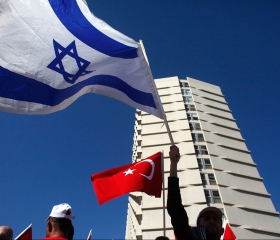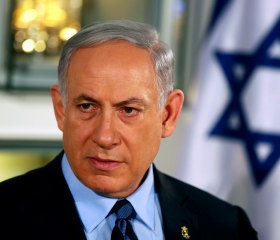The recent visit to Russia by Israel’s Prime Minister Benjamin Netanyahu triggered a wave of speculation about signs of a rapprochement between Russia and Israel. There was even talk about Israel replacing the USA with Russia. Before leaving the Russian capital the Israeli prime minister even saw fit to make a special statement to scotch the speculation about the Jewish state changing its foreign policy priorities. “It is not desirable or practical to replace the United States with Russia,” Benjamin Netanyahu told a press conference.
The recent visit to Russia by Israel’s Prime Minister Benjamin Netanyahu triggered a wave of speculation about signs of a rapprochement between Russia and Israel. There was even talk about Israel replacing the USA with Russia. Before leaving the Russian capital the Israeli prime minister even saw fit to make a special statement to scotch the speculation about the Jewish state changing its foreign policy priorities. “It is not desirable or practical to replace the United States with Russia,” Benjamin Netanyahu told a press conference.
He meant what he said. It is true that Russian-Israeli relations have reached an all-time high in economic, political and military fields. One cannot help recalling the trendy word combination “strategic partnership.” Many observers have noted that this was the third meeting between Putin and Netanyahu within a year, compared to just one meeting with Barack Obama. In reality, though, it merely indicates the difference of approach to building relations with different powers. In the case of Russia, personal communication between leaders is an effective instrument, especially because the two men obviously have established a mutual rapport while the chemistry between Barack Obama and the Israeli Prime Minister is not so good. Nevertheless there are enough forces in the USA, especially in Congress, capable of protecting Israel’s interests.
In spite of everything, the USA is Israel’s strategic partner and main ally. Russia cannot replace the USA in this capacity either militarily or financially. This is not to say that Russia and Israel have nothing to talk about. On the contrary, the range of issues of mutual interest seems to be widening all the time. The main reason is Russia’s growing involvement in the region’s affairs, especially since the events of the past few years have shown that the USA is by no means always able or willing to deal with the region’s problems, which forces Israel to act on its own and to look for allies.
Iran and Syria were frequently mentioned during Netanyahu’s recent visit to Moscow. Israel is very worried by the increase of the Iranian (and pro-Iranian) military presence in Syria, especially close to the Israeli border, and the growing Iranian influence in the region as a whole. At a meeting with the Jewish community in Moscow Benjamin Netanyahu minced no words in declaring that he would not allow Syria to become a base for attacks against Israel. Israel has demonstrated its determination in April 2016 by launching a series of air raids on targets in Syria, officially in order to prevent the transfer of certain weapons to Hezbollah in Lebanon.
It is unlikely that Moscow will be able to directly influence the Syrian authorities on issues of cooperation with Teheran since the Iranian military and Lebanon-based Hezbollah units are at least as important for the survival of Bashar Assad’s regime as the support of the Russian Military Space Forces. However, Russian representatives may well suggest to the Syrian leader that it would make sense not to provoke the neighbour and to keep the Iranian units away from the border.
One has to bear in mind that Moscow has direct contact with Iran and could act as a mediator, for example, by discussing with Teheran the “red lines” in Syria which Netanyahu mentioned in his speech in Moscow, or by talking the Iranians out of giving modern weapons to Hezbollah.
In addition, Israel is very worried about the plans of massive intensification of Russian-Iranian military-technical cooperation after the lifting of international sanctions. Iran is believed to be interested in buying more Russian-made air defense systems (and the talk now is about S-400), aircraft and submarines. Practice has shown that Israel has enough clout to persuade the Russian leadership to scrap some of the contracts.
One version has it that the Israelis would not have been able to assassinate Samir Kuntar, a high-ranking Hezbollah operative in Damascus in December 2015, without a tacit agreement of Russia which at the time de facto controlled the air space over Syria.
For its part Israel can offer Russia intelligence information which can be very helpful for the Russian military in Syria. Israel’s intelligence potential, both human and technical, has become something of a legend in the region making Israel a very valuable partner in this field.
Another important topic is Arab-Israeli settlement, which again hit the headlines after the “knife intifada” and the French attempts to revive the peace process. The Middle East Quartet (Russia, US, EU and UN) is preparing a report on the state of the peace process which has been in cold storage for two years already, and recommendations on resuming it.
Israel is traditionally nervy about attempts by external players to influence the status quo as regards borders. Netanyahu for his part has already said that a settlement must be based on a revised Arab Peace Initiative because Israel is categorically opposed to a return to the 1967 borders considering them to be too vulnerable. Israel is determined to consolidate its control over the Golan Heights, as Netanyahu declared in May 2016.
On these issues Russia can potentially play a part as a permanent member of the UN SC and a member of the Middle East Quartet by either initiating or blocking the discussion of some issues. At the end of the day, Israel stands to gain if there are fewer members of the Security Council prepared to openly criticise it. It is notable that Arab public opinion has more than once expressed puzzlement (and sometimes indignation) over the Kremlin’s mute reaction to the actions of Israeli troops in Gaza.
It has to be said that Moscow is unlikely to radically revise its position on Middle East settlement. It has already made it clear that it is against revising the Arab Peace Initiative which it considers to be a key element of the peace process, and is unlikely to recognize the Golan Heights as part of Israel. However, in the circumstances its benign neutrality or simply inaction (especially at the UN level) would suffice.
Israel for its part may help Russia in some diplomatic disputes, for example by acting as a broker between Moscow and Ankara. An unpleasant incident also occurred between Israel and Turkey in 2010 (it has to be noted however that it was Turks and not Israelis who died as a result of the interception of an international humanitarian flotilla which tried to break the blockade of the Gaza Strip), but the two countries have since managed to overcome their mutual ire. Interestingly, Vladimir Putin referred to this fact in his speech after the talks with Benjamin Netanyahu.
Having said that, it is hard to predict what the concrete substance of Russian-Israeli partnership may be, but obviously, it has massive potential, and most importantly, both sides have a strong motivation. In any case, as the experience of the USSR has shown, Moscow needs to interact with Israel if it wants to pursue an active Middle East policy. The question is whether the interaction would be with a plus or a minus sign.






